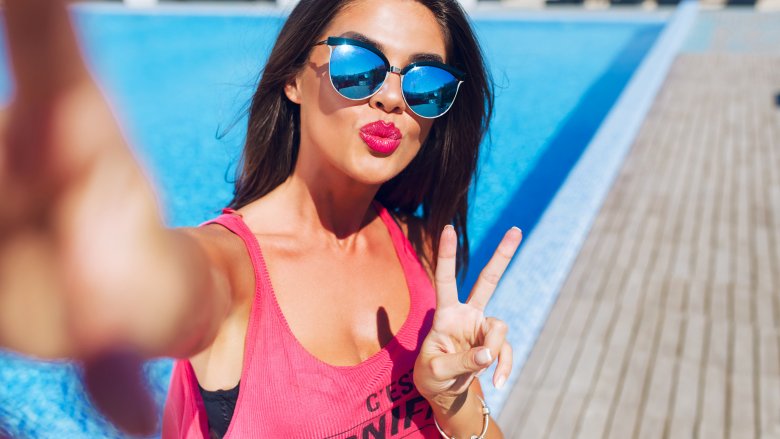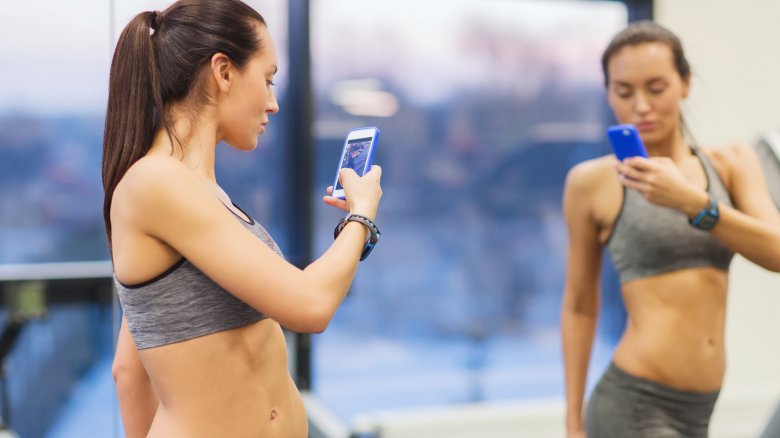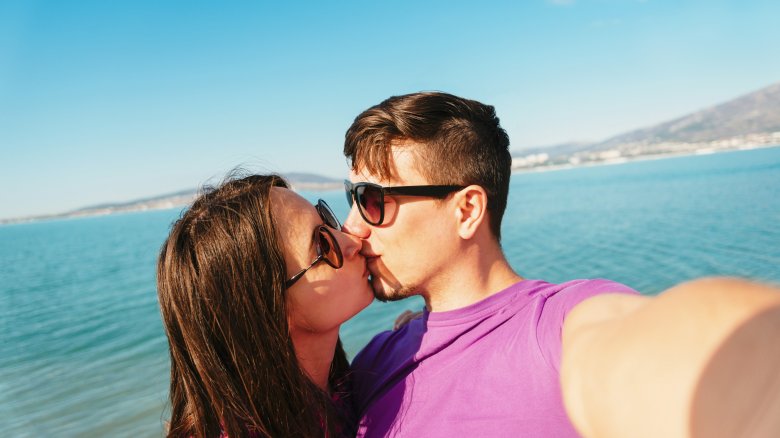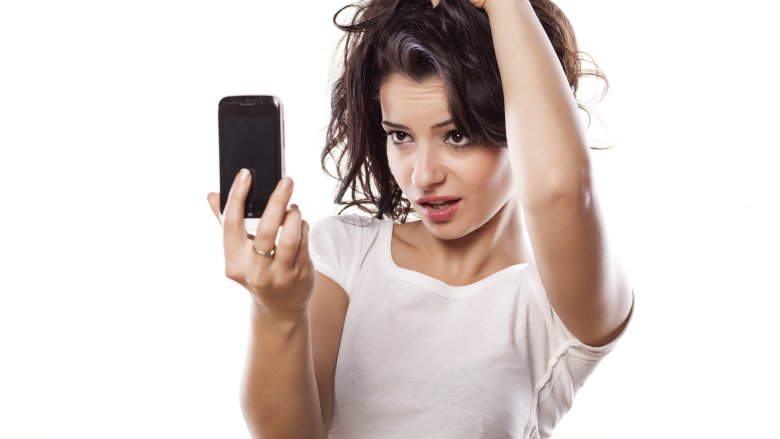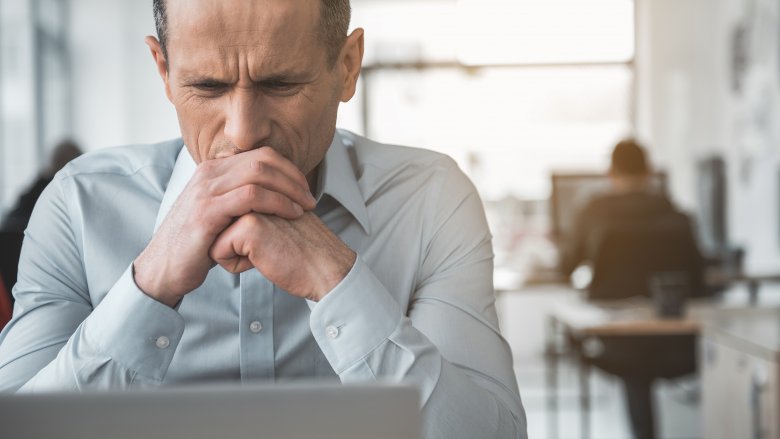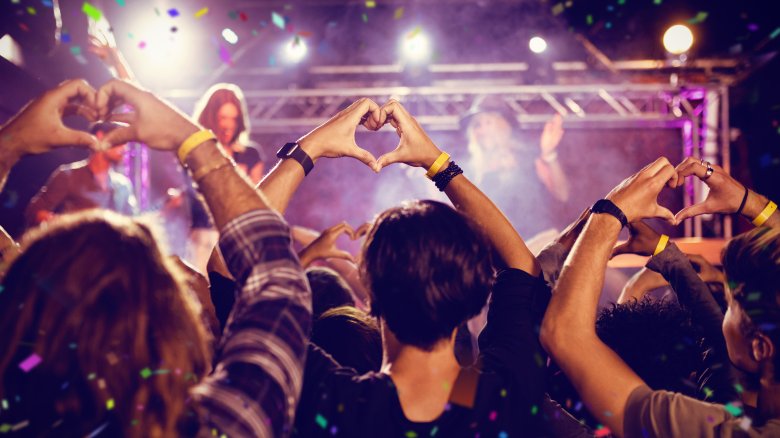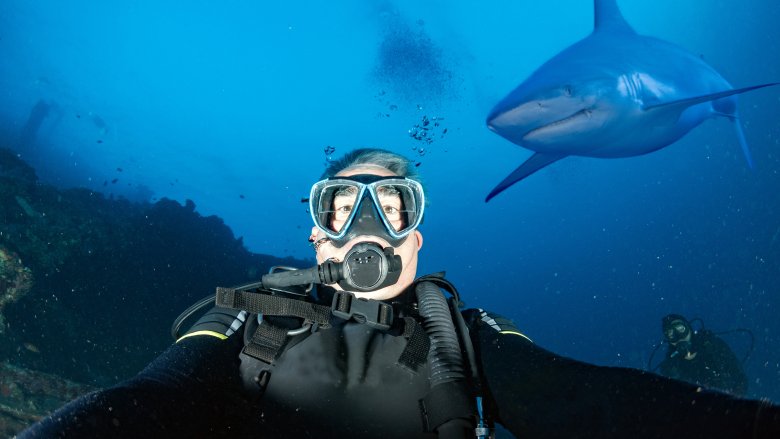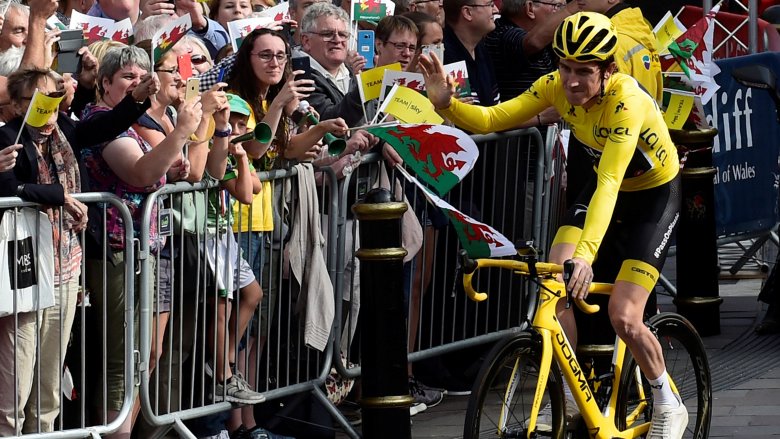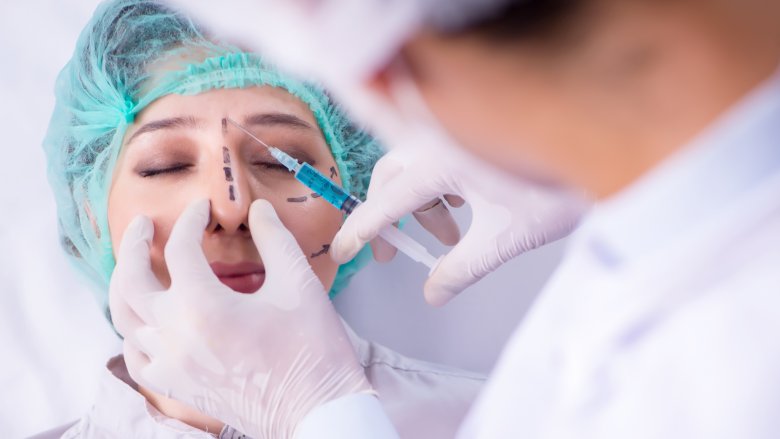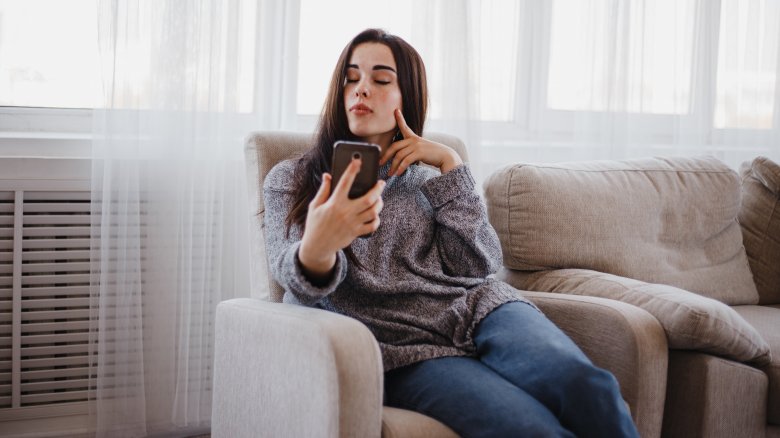The Dark Side Of Selfies
The selfie finally made it into Oxford's dictionary in 2013, but we've been drowning in them for what seems like an eternity. Our social media feeds are full of self-shot photos of our friends and family looking better than we do, doing things that are more exciting than the things we do, and just generally proving to the world that they're better than we are. That's kind of what it feels like, anyway. The truth, though, is that all may not be as well as it seems in the oversharing selfie-taker's life. While some people may take selfies because they're genuinely happy with themselves and their lives, other people take selfies for much more disturbing reasons. In some cases, selfies can even be deadly.
So if you get a kind of cringey feeling inside when you see your duck-lipped friends posing on cliffs with their unnaturally perfect spouses, it's probably because you have a good reason to feel that way — selfies have a dark side, just like you always thought they did.
Excessive selfie-takers tend to have shallow relationships
It's probably worth examining your thought processes when you decide to jump on Facebook to post a photo of yourself doing whatever. If your goal is to impress your friends and random other followers with scenes from your wild adventures, you might be succeeding in doing that — but impressed or not, people don't tend to react exactly the way you probably hoped they would. Instead of experiencing feelings of "Wow, I'm so happy for my friend who is having all those great adventures," viewers may react more along the lines of, "Yeesh, I can't really relate to this person at all."
According to Time, a joint study by the universities of Birmingham, Heriot-Watt, and Edinburgh found that "Increased frequency of sharing photographs of the self, regardless of the type of target sharing the photographs, is related to a decrease in intimacy." That basically means that if you post a lot of selfies, your relationships may also be a bit empty and meaningless.
If you're a chronic selfie-poster, there's a bright side to all the shallow online relationships you might be cultivating on social media — you're probably not going to alienate the people you're closest to, like your best friends and immediate families. Those people tend to be less put-off overall by all those selfies, so if you really don't care that much about finding meaning in your casual relationships, you can keep posting those selfies without regret.
Excessive selfie-sharing is associated with relationship trouble
How would you feel if you discovered your significant other was texting pictures of himself or herself to old college classmates, like, on a daily basis? That's kind of what you're doing when you post selfies on Facebook, too, except it doesn't seem quite so obnoxious because it's not aimed at specific individuals. Still, according to Bustle, a study published in Cyberpsychology, Behavior, and Social Networking Journal found the habit of posting a lot of pictures of yourself on social media is strongly correlated with relationship troubles. The study found that significant others of oversharers were sometimes borderline obsessive about following the likes and comments on their partners' selfie posts, and there was also a correlation between excessive selfie-sharing and things like infidelity and divorce. So it's not just that your selfies are making your partner jealous, they may also be encouraging cheating.
The messed-up-relationship thing actually goes beyond just posting photos of yourself on Facebook — another study published in the Personality and Social Psychology Bulletin found that people who share a lot of cutesy photographs of themselves with their partners also tended to suffer from relationship trouble. So yes, the people in your social media feed who are projecting the strongest "perfect relationship" image may actually be in the most insecure relationships. So if you ever thought maybe social media isn't really a true window into people's lives, it turns out you were probably right.
Selfies can become a dangerous obsession
For most people, the occasional selfie is pretty innocent and doesn't really say anything about one's mental state. But for some people, taking selfies can become dangerously addictive. According to ABC, taking a lot of selfies and, specifically, obsessing over whether those selfies project an image of perfection, can be a sign of body dysmorphic disorder, which is a frighteningly common psychological disorder characterized by a fear that other people might judge you for having a less-than-perfect physical appearance.
Body dysmorphic disorder is present in about 1 percent of the American population, and is (unsurprisingly) most common in teenagers and adolescents. Sufferers have an unrealistic belief that the world expects physical perfection, and a distorted view of their own looks — they may view a minor flaw that no one else notices as a hideous disfigurement. In severe cases, people with body dysmorphic disorder may isolate themselves from friends and family, and sometimes even attempt suicide. How do selfies fit into this? Selfies are a way for sufferers to pick apart their own appearance — a perfect selfie can be shared with the world as a way of meeting that fictional expectation of perfection. If a selfie isn't perfect (and let's face it, most of them aren't), then another one is needed. If that one isn't perfect ... well, you can see how the spiral starts.
Sharing selfies may make you less desirable as an employee
If you share a lot of selfies and you're also having trouble landing a job, you may have to consider that your social media habits might have something to do with that unemployment check you can't seem to swap for gainful employment. According to CBS, some employers may regard oversharing as indicative of certain undesirable personality characteristics, which could cost you that dream job.
People who take and share a lot of selfies can be perceived as narcissistic, and narcissism is not usually a desirable quality in an employee, unless your dream job happens to be something fundamentally narcissistic, like modeling bikinis or being a politician. Employers looking for team players (which is most of them) might view someone who posts a lot of selfies as too self-absorbed to be a part of a team or too lacking in self-control to make a reliable employee. They may also wonder if people who overshare information about their personal lives will overshare information about the company they work for, too — and no one wants to hire someone who might share a photo of the boss after he had too much to drink at the company Christmas party, however small that possibility might be. So it's really best to enter into every job search with the expectation that all your online activities are fair game, and maybe just tone down the sexy duck lip selfies. You know, just a little.
You don't actually have an audience of adoring fans
Social media has revolutionized the way we stay in touch with people we never actually cared about, but it also has some unexpected side effects. When you live your life in a public forum, you may have unrealistic ideas about just how many people are paying attention. In other words, you may think of yourself as a sort of minor celebrity, when in fact you're really just that person no one can relate to because your social media feel is full of unrelatable selfies.
Social media is a way for people who enjoy being the center of attention to feel like they really are the center of attention, but in most cases that feeling is an illusion. Common Sense Media calls this "the imaginary audience," or the self-delusional notion that everyone you know is constantly thinking of and talking about you. Selfies fuel the delusion because likes and comments seem to provide confirmation that the imaginary audience actually exists.
Common Sense Media does also say that selfies aren't necessarily a bad thing for kids and teenagers, since they're still learning to make friends and discover themselves. But kids are also prone to having unrealistic ideas about social media in general, so it's a good idea to make sure parents recognize and educate their kids about oversharing, self-obsessing, and the uglier aspects of turning the camera on themselves rather than on the broader world around them.
Selfies kill more people than sharks
Depending how narcissistic you are and how many selfies you've been taking, you may not be aware of the most alarming piece of selfie-related news: Selfies kill. Literally. In fact a Conde Nast Traveler article compared selfie deaths to death by shark attack and concluded that selfie deaths came out ahead in 2015, which seems pretty shocking until you look at the number of shark attack fatalities and realize that it's not all that high. (Sharks typically kill around six people each year.) Still, even one death from something as preventable as a stupidly executed selfie is too many.
Most selfie-related deaths occur when the selfie-taker is in an impressive yet risky situation, like standing in front of a moving train or a charging bull, or posing with a live grenade. In one recent tragedy, a Polish couple died in front of their small children after they hopped a safety barrier and attempted to take a selfie on the edge of a cliff.
Now, it's worth noting that people die doing stupid things all the time, so really this is just another version of climbing Mount Everest or doing acrobatics atop a 62-story skyscraper, except that it's accessible to just about everyone with a smartphone. So as much as we'd all like to believe that most humans are smart enough to not die in a selfie-related accident, one should never underestimate the power of "that won't happen to me."
Selfies endanger others
When you're taking a photo of yourself, you tend to be oblivious to everything that's happening around you. After all, it's important to make sure the light is right, your hair is sufficiently wind-swept but not too wind-swept, and that your duck lips are duckalicious. That's fine if you're in your backyard, as long as a rabid dog didn't happen to wander in through a hole in your fence, but if you're in public your self-absorption could actually endanger someone else's life.
According to ABC, selfie-taking was a problem at the 2014 Tour de France, with some spectators so eager to grab photos of themselves at the event that they would walk into the cyclists' paths and turn their backs. One rider reported a knee injury after having to dodge a selfie-taker, and others complained about the hazards of selfie-takers who "obviously don't see us coming."
Tour de France cyclists aren't the only people who have to worry about the hazards of oblivious selfie-takers — this is also a problem with drivers, too. There's even an Instagram tag for it, #drivingselfie, which at the end of 2018 had more than 31,000 posts. Shooting selfies while behind the wheel is just another form of distracted driving, which Nationwide Insurance says causes more than 3,300 deaths per year. So note to world: Generally speaking, any time you might endanger someone by not paying attention to what you're doing, that's probably a terrible time for a selfie.
Your selfies could drive you to the plastic surgeon
Selfies appear to be linked to self-esteem, but to what extent? A pretty big one, if you believe America's plastic surgeons. According to CBS, an alarming number of people are seeking plastic surgery to permanently filter themselves — as in, Snapchat filter themselves. About 55 percent of plastic surgeons in the United States say they have seen patients who mention selfies as contributing to their desire to have work done. The phenomena, sometimes called "Snapchat dysmorphia," seems to be directly related to those filters that can make your eyes bigger, your nose smaller, and your lips fuller.
Selfies can give you a distorted self image in another pretty inescapable way: When you shoot a photo of yourself with the camera in close proximity, your features can sometimes look a little odd. The wide angle view might give you a disproportionately large nose, for example, and if your goal is to look "better" in a selfie, you might decide on the rather drastic step of having your face physically altered so your features will look less distorted ... on camera. Never mind that in person you'll look like you have a freakishly small nose. Who cares as long as you look stunning in that Facebook post, right? Because no one socially interacts in person anymore. Do they?
I'm too sexy for my socioeconomic status
What about those super-sexy selfies that seem to serve no purpose other than making everyone who sees them cringe? A study published in the Proceedings of the National Academy of Sciences found that the women who tended to sexualize themselves in selfies the most lived in areas where there were socioeconomic disparities. Interestingly, the trend did not seem to be associated with gender inequality — in other words, women didn't seem to be compelled to post sexy selfies because of a need to compete with other women in a society that values appearance over achievement. Rather, it appeared to be something women might do if they had limited economic opportunities.
The research suggested that being poor or disadvantaged "increases competitiveness and status anxiety amongst people at all levels of the social hierarchy, making them sensitive to where they sit on the social ladder." So if you lack educational or financial opportunity, you might sexualize yourself in the hope that your looks can afford you some advantage over your peers. So that may not make those half-undressed photos of your childhood BFF that just showed up in your Facebook feed any less cringeworthy, but at least now you know it isn't just about vanity ... necessarily.
Surprise — posting a lot of selfies is narcissistic
If you've always suspected that people who post a lot of selfies are just plain narcissistic, well, a couple studies have shown that people who post a lot of selfies are just plain narcissistic. According to a 2015 Ohio State University study, men who take a lot of selfies tended to score higher on "measures of narcissism and psychopathy." Now, psychopathy is a strong word, so it's worth remembering that it's not a personality disorder, it's a combination of personality traits, and most "psychopaths" are productive, nonviolent members of society. But if you want an inkling of whether your significant other may be more inclined to put his or her own interests above yours, selfie-posting could be one measuring stick. (There are probably other, better ones, but hey.)
Now, the Ohio State study — and a follow-up study that included both men and women — found that the correlation between selfies and narcissism was distinct but small, which means your partner's obsessive selfie-posting habit is more likely to be rooted in something other than overt narcissism or psychopathy. That doesn't necessarily mean you should relax, though, because there are plenty of other reasons to be alarmed, like the very real fear that the love of your life might die while taking a selfie with a shark or something, so perhaps that's something you should eventually have a talk about. After you just get that one last selfie of you sitting at your desk reading this article about selfies.
